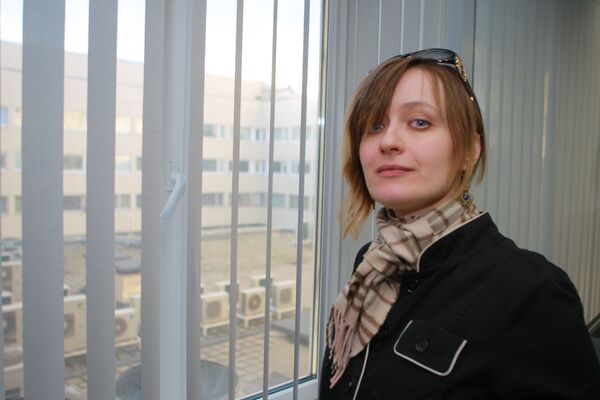Earlier this month, Russian-American journalist Diana Bruk shocked the delicate sensibilities of the American reading public by writing a no-holds-barred account of why she loves (and hates!) dating Russian men.
In her essay, published by Salon.com, Bruk talked about how her feminist sensibilities came up against her carnal desires when she dated Russians. She talked about how fun, scary, unpredictable and exciting it is to date a Russian man if you happen to also be a modern girl who graduated from Sarah Lawrence. She talked about the possessive and aggressive nature of many of the men she dated, and how it combined itself with the sort of passion and tenderness her American lovers frequently lacked.

She talked about how the Russian ideal of masculinity is both thrilling and damaging – a kind of conundrum that, to me, immediately brought back the words from that old U2 song: “With or without you / With or without you / I can’t live / With or without you.”
Many Russians were outraged, saying Bruk had stereotyped them. Many other Russians were delighted, saying that Bruk’s incredible honesty about her personal experiences proved once and for all that Russian dudes simply do it better – and not just when it comes to sex. Some Americans were also obviously offended. Other Americans used Bruk’s essay as “proof” that the feminist movement is a bunch of BS.
What was most interesting to me was seeing the number of commenters who essentially told Bruk that they hope she eventually marries a Russian – and that he will go on to knock her teeth out. That, they reasoned, is appropriate punishment for an uppity girl who dares to be open about the fact that she wants “a man who’s a gentleman at dinner and an animal in bed” and that every once in a while, she just wants to scream to an awkward and conscientious Western lover that sex “isn’t a dinner party. You’re not writing an essay. Just let go.”
Like Bruk, I have also encountered the notion that domestic violence should be a kind of punitive experience for a woman who has chosen to associate with the “wrong” kind of man. A reader who disagrees with me on something will dig around on the Internet, find out that I married a Russian, and start sending me hate mail with such charming sentiments as, “I hope he hits you regularly – since that’s the only thing these guys are good for.”
At the heart of this issue is the archaic notion of “our women” vs. “their women.” A woman can’t belong to several cultures, you see. She must be “claimed” by someone – and to suffer accordingly. This possessiveness is not exclusive to Russians by a long shot, and seeing the number of people wishing Bruk ill made me realize that they all protest too much. “Yeah, we think domestic violence in Russia is wrong – and that’s why we hope it happens to you!” Right.
According to the latest findings of Russia’s State Statistics Service, one in five Russian women is abused physically by her partner, while a total of 40 percent suffer from verbal abuse. These aren’t numbers to be taken lightly – and the idea that a “real man” must dominate his woman in every way, which is common in Russia, does feed into the problem of abuse, whether we like to admit this or not.
Yet I also think it is very silly to assume that a woman who wants a man to take charge every once in a while – particularly in bed – is simply asking for abuse.
Furthermore, dismissing Bruk’s internal struggle on the subject of equality and desire as a form of adolescent posturing is a cop-out. It amounts to whitewashing the complexities of relationships in general.
The strength of Bruk’s piece lies in the discomfort it generates for everyone. Bruk admitted something she was not supposed to admit – the idea that desire doesn’t deal in absolutes. It’s no wonder people want to see her get her teeth knocked out.
Trendwatching in Russia is an extreme sport: if you’re not dodging champagne corks at weddings, you’re busy avoiding getting trampled by spike heels on public transportation. Thankfully, due to an amazing combination of masochism and bravado, I will do it for you while you read all about it from the safety of your living room.
Natalia Antonova is the acting editor-in-chief of The Moscow News. She also works as a playwright – her work has been featured at the Lyubimovka Festival in Moscow and Gogolfest in Kiev, Ukraine. She was born in Ukraine, but spent most of her life in the United States. She graduated from Duke University, where she majored in English and Slavic Literature. Before coming to Moscow, she worked in Dubai, UAE and Amman, Jordan. Her writing has been featured in The Guardian, Foreign Policy, Russia Profile, AlterNet, et al.
Trendwatcher: Of Russian Tourists, Egyptian Violence, and Fate
Trendwatcher: Moscow’s Migrant Problem – And Lack of Community
Trendwatcher: Mizulina, Gay Activists – And Fame
Trendwatcher: Navalny and the Train Station Blues
Trendwatcher: Russia, Self-Defense and Trayvon Martin
Trendwatcher: Expat Women in Moscow: When Dating is No Disaster
Trendwatcher: Yarovaya and WWII: With Friends Like These…
Trendwatcher: The Spies Strike Back

